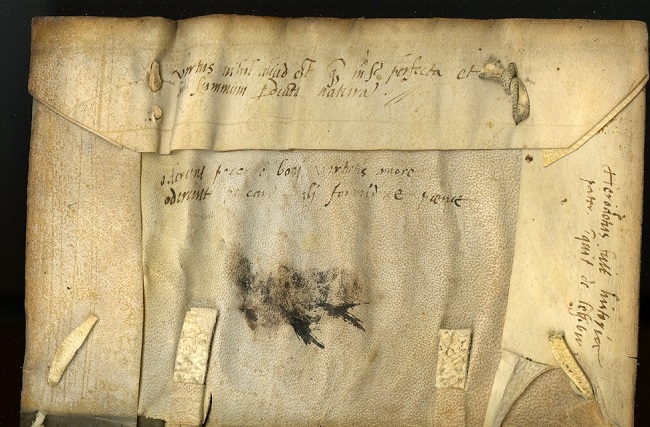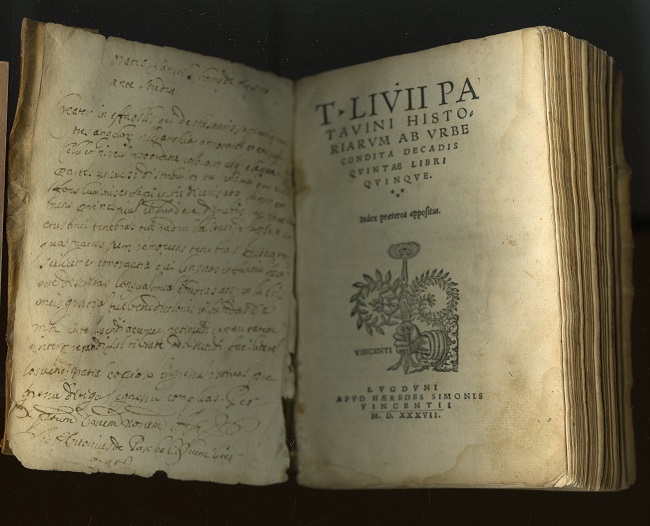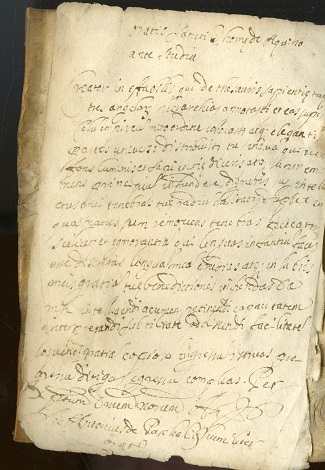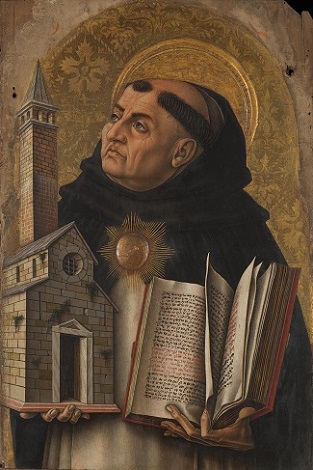Enjoy this post by Natalie Thornton, one of our Special Collections Freshman Fellows for the 2019-2020 academic year!
My name is Natalie Thornton, and I am a pre-med Freshman studying Classics. This has been my fifth year studying Latin, and I was beyond honored to be selected as a Freshman Fellow and have the opportunity to translate original post-classical Latin texts from rare books housed at the George Peabody Library. These later Latin texts (from ca. 1400 – 1750) are undergoing more thorough examination by students and researchers in the disciplinary fields of classical reception and Neo-Latin studies.
Often one of the best places to discover important examples of this later Latin is inside the covers or in the margins of a former student’s copy of a classical text. In this image, for example, we find, in addition to the ink traces in the center –probably from a former owner priming the ink to flow from their quill pen– a few quotes and proverbs from Cicero, Ovid, and Horace.

My favorite of these quotes is from Cicero’s work, De Legibus (On the Laws) 1.8. It reads, now slightly warped by the folds in the vellum binding: Virtus nihil aliud est quam in se perfecta et ad summum perducta natura, or “Virtue is nothing other than nature perfected in itself and led to its ultimate height.” The structure of this quotation is particularly interesting because it includes a chiasmus, a rhetorical construction that follows ABBA word order. In this case, the line is balanced by the subjects on either end of the sentence, and the perfect passive participles, which describe them, are embraced between: virtus (A) … perfecta (B) and perducta (B) natura (A). The framing image is especially important to note as both virtus and natura are described as perfected “within themselves, in se” indicating that the structure of the line also reflects its meaning.
Let’s take a closer look at the book in which these quotations are found. A recent purchase by the JHU Libraries, it is a copy of the Roman historian Livy (59b.c.e – 17c.e.), published in 1537 in Lyon, France. Livy’s full title reads, Historiarum ab urbe condita decadis quintae libri quinque or “The Five Books on the History [of Rome] since the founding of the city as divided into five decades.” Those decades refer not to temporal periods of ten years, but to the number of books, ten, that could be inscribed onto a parchment codex by early copyists, as noted in the Oxford Companion to Classical Civilization. One can find the full text in Latin and English of Livy’s work in a Loeb e-book edition. As Hopkins students, we can access these reference works online as we work from home, so do not hesitate to contact a Librarian if you have any trouble.

One can see here, on what is known as the verso of the front free endpaper (bibliographic descriptors used by book historians and bibliographers), a manuscript transcription titled Oratio Sancti Thomi de Aquino ante studium, (“The Prayer of Saint Thomas Aquinas before study”). Saint Thomas Aquinas (1225–1274), the patron saint of all things academic, from scholars to schools, and even pencil-makers, is said to have prayed these words whenever he sat down to study. It is thus fitting that this same prayer would have been transcribed here and read over again and again by a former student, one Antonio Pasqualigo, who came from a very influential 16th and 17th Century Venetian family, at the beginning of his Latin endeavors, and as I myself am now doing as an undergraduate. Here is a close up of that page and a wonderful image of a haloed Aquinas himself holding a manuscript book. This detail comes from an altar piece now in the National Gallery London by the Renaissance artist Carlo Crivelli (ca. 1430-1494).


The prayer transcribed, and with my translation following, reads:
Creator ineffabilis qui de thesauris sapientiae tuae
tres angelorum hierarchias annotasti et eas super
caelum empyreum miro ordine collocasti atque elegantissime
partes universi distribuisti: tu inquam, qui verus
5 fons luminis et sapientiae diceris atque supereminens
principium, infundere digneris super intellectus
mei tenebras tuae radium claritatis, duplices, in
qua natus sum, removens tenebras peccatum
scilicet et ignorantiam. Tu, qui linguas infantium facis
10 esse disertas, linguam meam erudias atque in labiis
meis gratiam tuae benedictionis infundas. Da
mihi intelligendi acumen, retinendi capacitatem,
interpretandi subtilitatem, addiscendi facilitatem
loquendi gratiam copiosam. Ingressum instruas, progressum
dirigas, egressum compleas.
O ineffable Father, who from the treasure rooms of your knowledge
assigned three hierarchies of angels and placed these above
the fiery heaven in a wondrous order and most elegantly
distributed the parts of the universe: You, I say, who are said to be the true
fount of light and knowledge, and who are watching over
this beginning, may you consider pouring out the ray of your light upon the darkness
of my understanding, removing the two shades into which I was born,
namely sin and ignorance. You, who make the tongues of the speechless
to be eloquent, may you educate my tongue and pour the favor of your blessing on my lips.
Give me the keenness of understanding, the capacity of retaining, the precision of comprehending, a readiness for learning, and the eloquent grace of speaking. May you instruct this undertaking, direct its progress, and bring to completion its end.
As I have been raised Catholic in an Italian family and have only just begun my own studies at Hopkins, I have been able to appreciate the many nuances in this prayer. I cannot remember how many times my nonna has said “Dio ti benedica,” or “God bless you,” as well as “Dami un bacetto” or “Give me a little kiss,” to me in Italian, making my translation from Latin second nature as I have become familiar with phrases constructed in such similar ways (compare lines 10-11 above). I came across another happy coincidence with regards to Saint Thomas during my first semester in the class Dante Visits the Afterlife, taught by Professor Walter Stephens, in which we read La Divina Commedia, or The Divine Comedy, by Dante Alighieri in its entirety. I learned that Dante was certainly well versed in the philosophy of Thomas Aquinas, as Dante makes many direct references to him and his works throughout the Comedy. It is no coincidence that the relationship between seeing, illumination, and understanding, explained so elaborately in the Paradiso, is also alluded to here in the prayer (lines 6-7 above). For example, in Canto 10, Thomas Aquinas appears as an ‘ardenti soli’ or ‘burning sun’ and addresses Dante directly saying: “Quando / lo raggio de la grazia…mutliplicatio in te tanto resplende che ti conduce su per quella scala / u’ sanza risalir nessun discende…” “Since / the ray of grace…so shines, multiplied in you, that it leads you up along the ladder that no one descends without climbing it again…” (10.82-87, Purgatorio). Aquinas gives a clear prediction of the pilgrim’s ultimate salvation as the multiplied light of grace within the pilgrim becomes so strong that it enables him to climb the ladder of contemplation, which he is assured to ascend again after earthly death. In this instance and several others, images of light are used to delineate a stark and spiritual difference between darkness and ignorance, illumination and understanding. Notice too, finally, the ‘ardenti soli,’ ‘burning sun’ on the chest of Aquinas symbolizing divine illumination in the painting by Crivelli above.
As we wrap up our work at the end of a very difficult semester and I look back fondly on my own journey, including both my ‘ingressum,’ or ‘setting forth’ as a freshman at Hopkins as well as my progress ‘progressum’ with my classmates, it is worth reflecting that we are all sharing in a common experience and can look forward to being together again soon. No matter how much one’s own study can seem like a private or independent matter, it is truly enriched by the connections we make, not only between our own individual experiences, but also with each other. In such a vibrant community where you are surrounded by people motivating one another to strive for their best, it becomes incredibly inspiring, and even sacred in a way, to continue that progress.
